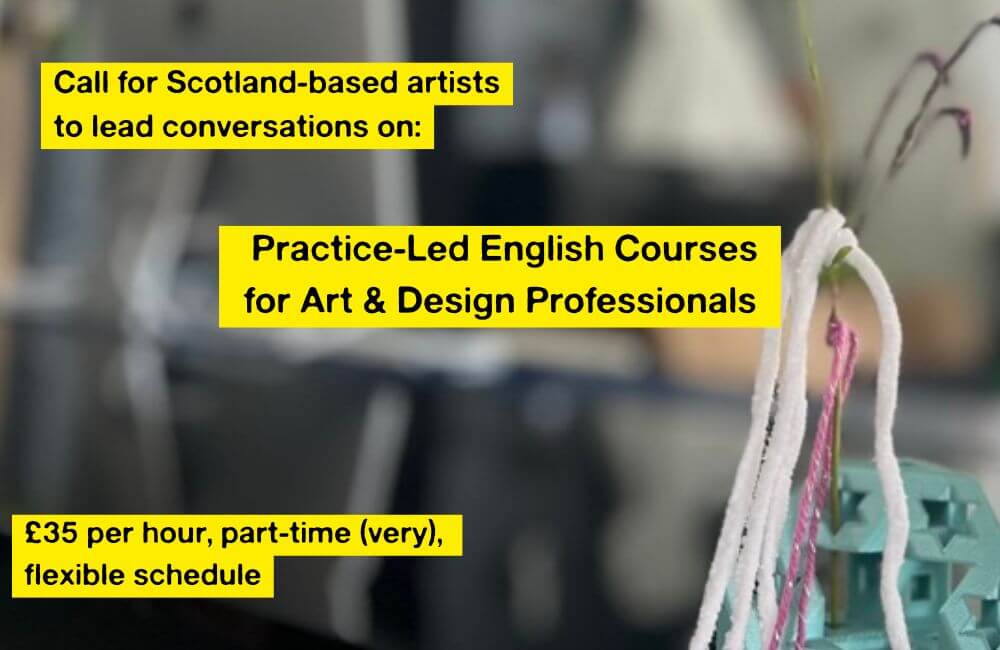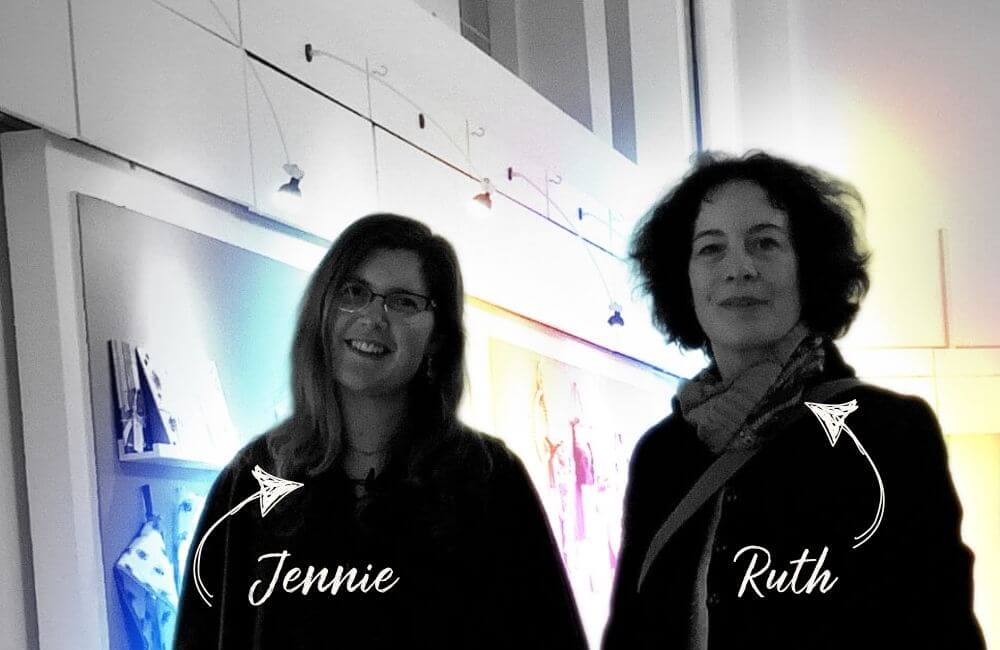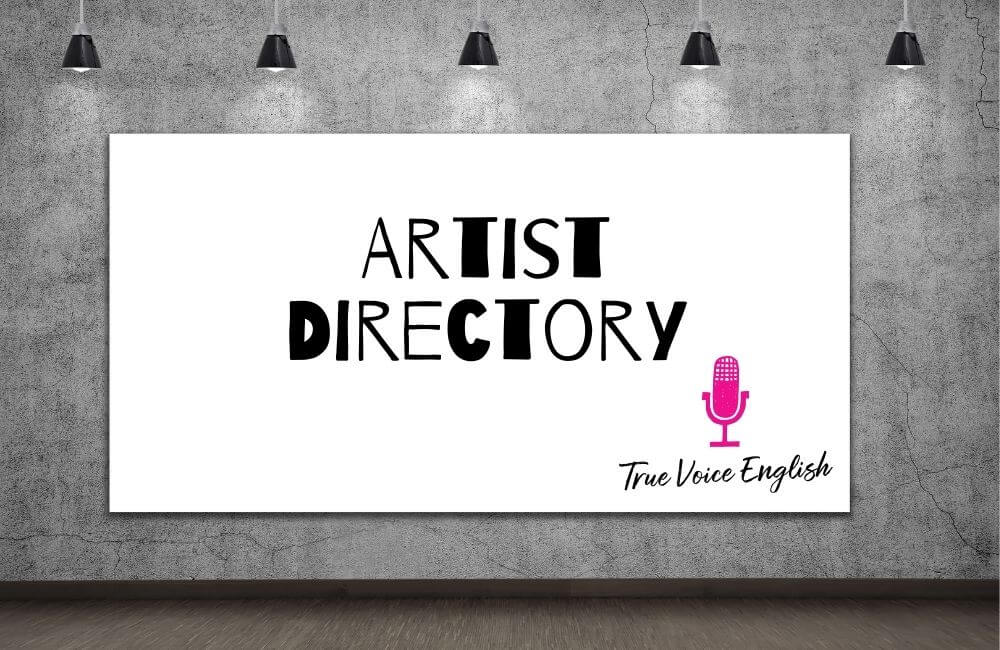A Paid Collaboration Opportunity for Scotland-Based Artists & Creatives
Help us Provide Studio-to-studio Real-World Conversations for International Art & Design Professionals and Art Schools
Hello!
Dear Artist or Creative,
Thanks for being here. This page introduces who we are, what we’re building, and how you might be part of it.
We’re still looking for all kinds of practising artists, designers, craftspeople, and makers who are curious about sharing their experience with an international creative community as a real-world element of an English training course to join our team in 2026.
You’ll be a collaborator in a flexible, project-based role. There are no long-term commitments and lots of meaningful interactions in which you get to share aspects of your practice with international peers.
We also have optional promotional opportunities too.
A Call for Artists & Creatives
We’d love to hear from you if you are:
-
A UK-based practising artist, designer, craftsperson, or maker (or a retired professional still active in art/AD education).
- Have a degree-level qualification
-
Someone who earns at least 50% of their income from creative work (of any kind: fine art, all forms of design, architecture, music, writing)
-
Comfortable meeting new people and speaking about your practice.
-
Strong in communication skills in English: listening, guiding conversation, simplifying language when needed without dumbing it down.
- Looking to supplement your income and discover new creative communities.

Who We Are
We’re Ruth Pringle and Jennie Reed.
We both have independent language teaching businesses (Ruth: conversation coaching through language holidays, Jennie: building confidence speaking through pronunciation coaching).
Together, we created True Voice English, a partnership to help international artists and creatives find confidence and authenticity in English.
Artists and makers don’t just need general English lessons; they need the language skills to collaborate, describe their processes, promote their own work, show up on social media, apply for formal opportunities, and make an impression during informal ones (that’s why we called this website Gigs & Jams).

Meet the UK artists participating in our Studio-to-Studio Conversations — established practitioners offering real-world dialogue for creative English growth.
→ View the Artist Directory
Our 3 Client Types
Our flagship offer is practice-led English courses for art and design porfessionals
We help International art school applicants become strong candiates.
We also support international art schools
About Our Method
Our English language tuition has three components:
Daily practical challenges in themed modules
Participants respond to the task in a 20-minute ‘sketch’ (it’s not always a drawing – it could be arranging objects, making a film, describing a scene)
Live ESL coaching
Targeted support from English teachers (building confidence, error correction, presentation, pronunciation).
Artist conversations
This is where you come in.
How You Help
Our clients (international artists and designers) chat with Scotland-based artists in relaxed, no-pressure conversations.
These aren’t lessons. They are conversations about the day-to-day realities of creative life. Answering simple questions like, ‘What are you working on this week?’ unearths the vocabulary they need more than any coursebook can.
And only fellow creatives know which questions to ask.
Your role is to lead short exchanges about the realities of making, promoting, and selling art or design.
You don’t need to prepare much or reveal too personal details; just be willing to share sincerely about your practice (whatever that means to you).
The Background
Ruth (an artist) first drafted the first online course for artists during lockdown, when the world of education went online, but her holiday offer couldn’t.
The written modules became the foundation, but they were only ever meant to be one part of the picture.
Jennie and Ruth began collaborating on other teaching projects, found a synergy, and in December 2024, took a fresh look at the Sketchbook course.
With Jennie’s coaching expertise, we redesigned the course in 2025 and pitched for Scottish Regional Edge Funding, asking for a marketing budget.
Unfortunately, we were only runners-up, which means we’ve been building audience and awareness slowly and organically, without professional help or ads.
Starting in October 2025, we have a place on the Scottish Government’s Techscaler programme.

Why Work With Us?
Creating employment and opportunity for local artists is not a side effect; it is a significant part of our vision. (Giving international artists the English course they need to build their career is the other).
We pay £35 per hour
-
We invite you to share your work internationally
-
You choose sessions that fit your schedule: it can supplement your income during quiet seasons and melt away during busy ones
-
Develop international contacts
-
Promote Perthshire (and Scotland) as regions of creativity.
What You’ll Need
-
A reliable internet connection.
-
Ability to use WhatsApp, and or SLACK for calls and messages.
-
We use Spond to announce bookings and request availability.
- Community spirit
-
Curiosity, openness, and willingness to connect.
Tips for Supporting Our Clients
- We will provide conversation cards. Initially, this will be a photo and/or text sent to you both on WhatsApp (we hope to have a deck of cards published by 2026). (Find out how you can contribute to building our photo library).
-
It might be tempting for you to correct errors, but try to think of yourself as a friend or a peer.
Lean in and quickly untangle anyone who gets stuck, but if you are mostly talking about language, you are not giving them the 1/3 real-world English practice they need. You can trust our big language ‘carwash’ to do the corrective language coaching. - You should aim to be talking about 30 % of the time and the client 70%). Be comfortable with a pause and don’t rush to fill it. (It comes with a little practice).
About the Client’s Journey
How the English as a Second Language Coaching Works
We describe the English skills workshops within the course as a bit like a car wash. Learners move through a series of short, proven, skills-focused coaching sessions — each targeting one aspect of their English.
One coach might help with pronunciation, another with confidence, a third with presentation skills.
This is innovative because most English courses have the same teacher (or teacher skill set/workbook), whereas we have a series of experts, each bringing their own transformation. (We can do this, because the rest of the course is so intensively 1:1 and personalised).
By the end of the 12-week course, learners are ready to use their English more clearly and confidently.
How the Artist Conversations Work
The skills the creatives most need are to explain their own ideas and work accurately, and discuss ideas generally. Repetition is a key ingredient in language learning, but it gets ‘boring.’ Changing the person the artist is speaking to creates natural repetition (and indeed the most important language emerges) without it ever feeling unnatural.
How the daily practical challenges work
Artists can’t respond to a practical task in any way other than in their own voice – their use of medium, the pressure in a line, the direction their thoughts follow form a hint.
By describing the results of their ‘sketches’, they are not only building fluency in describing their work, they are building identity as an English-speaking creative.
Frequently Asked Questions
What if I change my mind?
No problem. Please complete any scheduled calls with our client and let us know.
How do I get paid?
You invoice us monthly.
What do I get paid?
We pay £35 per contact hour. Any prep is included in this (it should be minimal).
What about my accent?
You can help our clients with any accent, as long as you speak clearly.
How do I know what to say?
We have conversation cards as prompts, but remember, everyday stuff is interesting. You don’t always need to be doing something special.
What’s the time commitment?
You are assigned a client for a fortnight. Together, you work out a schedule that has you talking 4 x times per week, for 10 -20 minutes per session. You can help more than one client per week (in this case, take a few notes).
How Do I Report?
You don’t need to. We’ll also be chatting with the clients over the same time period. This allows us to correct errors present in their English and have an overview of how it’s going.
Further Information
Related Posts for Language in AD Education

